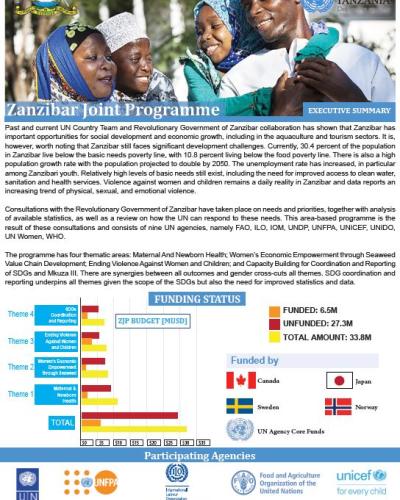Zanzibar Joint Programme Factsheet - August 2018

Past and current UN Country Team and Revolutionary Government of Zanzibar collaboration has shown that Zanzibar has important opportunities for social development and economic growth, including in the aquaculture and tourism sectors. It is, however, worth noting that Zanzibar still faces significant development challenges. Currently, 30.4 percent of the population in Zanzibar live below the basic needs poverty line, with 10.8 percent living below the food poverty line. There is also a high population growth rate with the population projected to double by 2050. The unemployment rate has increased, in particular among Zanzibari youth. Relatively high levels of basic needs still exist, including the need for improved access to clean water, sanitation and health services. Violence against women and children remains a daily reality in Zanzibar and data reports an increasing trend of physical, sexual, and emotional violence.
Consultations with the Revolutionary Government of Zanzibar have taken place on needs and priorities, together with analysis of available statistics, as well as a review on how the UN can respond to these needs. This area-based programme is the result of these consultations and consists of nine UN agencies, namely FAO, ILO, IOM, UNDP, UNFPA, UNICEF, UNIDO, UN Women and WHO.
The programme has four thematic areas: Maternal and Newborn Health; Women’s Economic Empowerment through Seaweed Value Chain Development; Ending Violence Against Women and Children; and Capacity Building for Coordination and Reporting of SDGs and Mkuza III. There are synergies between all outcomes and gender cross-cuts all themes. SDG coordination and reporting under pins all themes given the scope of the SDGs but also the need for improved statistics and data.














